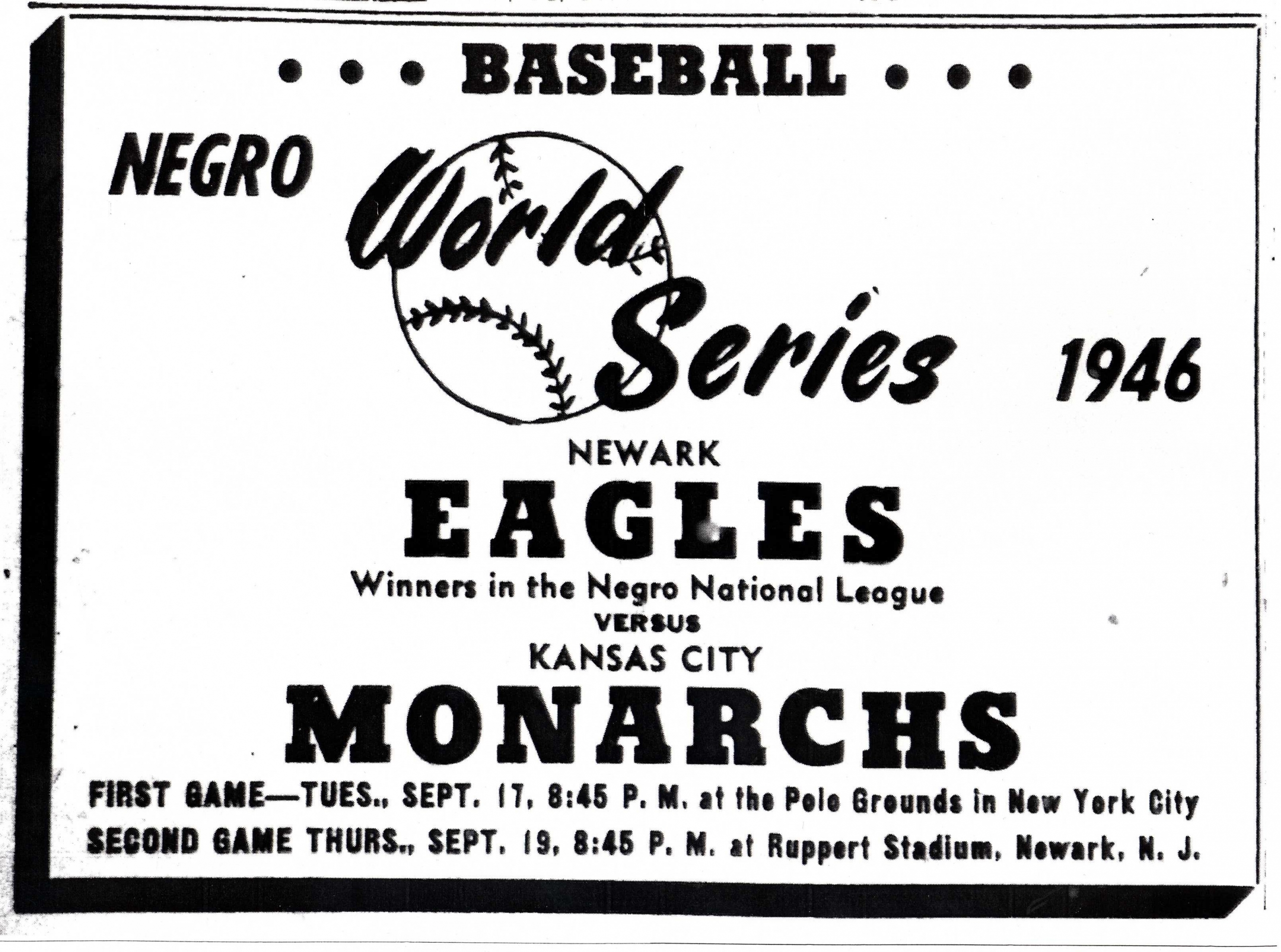September 17-29, 1946: Newark Eagles get the best of Kansas City Monarchs in Negro League World Series
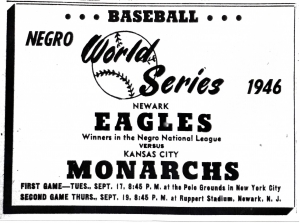 The 1946 Negro League World Series played between the Negro National League’s Newark Eagles and the Negro American League’s Kansas City Monarchs was one of the great postseason series in the history of professional baseball.
The 1946 Negro League World Series played between the Negro National League’s Newark Eagles and the Negro American League’s Kansas City Monarchs was one of the great postseason series in the history of professional baseball.
The Series was closely contested, going the full seven games, and is one of the most interesting focal points in the history of the Negro Leagues. In many ways it represented in microcosm the later, transitional, history of the Negro Leagues. Attendance varied wildly, depending on where and when the games were played. Often the distances between venues were so far that the Eagles and Monarchs traveled between cities by airplane instead of by train. The series featured future Hall of Famers and a number of others who went on to play in the major leagues.
However, the talent pool in the Negro Leagues was already being diminished as former Monarch Jackie Robinson was now playing with the Montreal Royals and would move to the Brooklyn Dodgers in 1947. Don Newcombe, who pitched as a 19-year-old for the Eagles in 1945, had been signed away to the Dodgers organizations as well. Although there was solid coverage of the Series in the African-American press, the games were often overshadowed by minor-league games in which Robinson played. Less than three seasons later, the Newark Eagles relocated to Houston before their, and the Negro Leagues’, inevitable demise.
In 1946 both the Eagles and Monarchs were powerhouse teams that won their respective leagues to earn the right to play in the World Series. The Monarchs were owned by J.L. Wilkinson and managed by Frank Duncan. They featured a number of star players including Hank Thompson at second base and often hitting in the leadoff spot, Ted Strong in right field, Willard Brown in the outfield and batting cleanup, and Buck O’Neil at first base. The Monarchs had a great pitching staff, with future Hall of Famer Hilton Smith, Connie Johnson, Jim LaMarque, and the one and only Satchel Paige. Including team owners, managers, players, and an umpire, 10 future Hall of Fame members were directly involved in the Series.1
Game One: September 17, 1946
Kansas City Monarchs 2, Newark Eagles 1
Polo Grounds, New York, NY
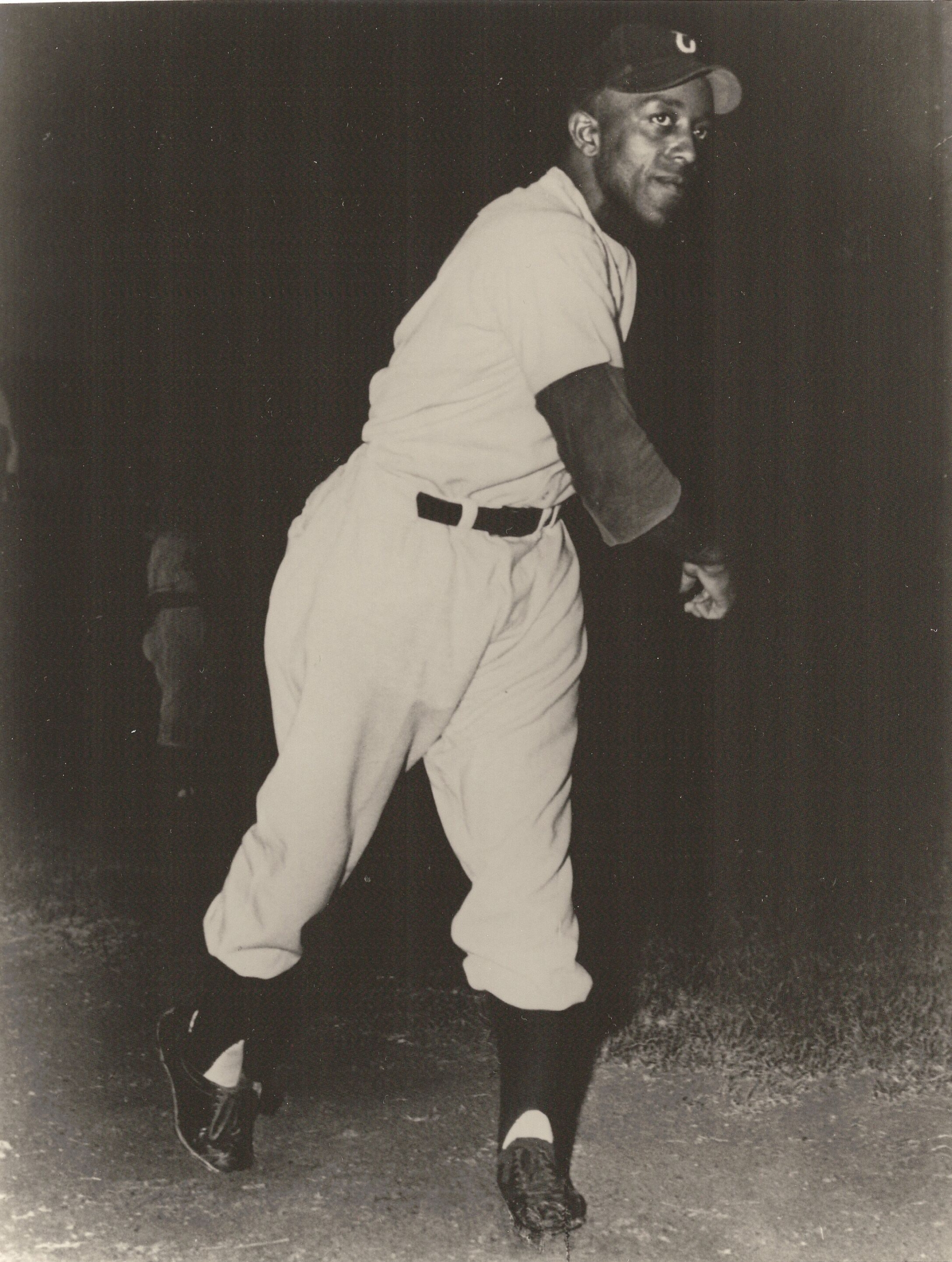 The opening game of the World Series was played on Tuesday night, September 17, at the Polo Grounds in New York City. The pitching matchup featured a pair of future Hall of Famers, with Hilton Smith starting for the Monarchs and Leon Day for the Eagles.
The opening game of the World Series was played on Tuesday night, September 17, at the Polo Grounds in New York City. The pitching matchup featured a pair of future Hall of Famers, with Hilton Smith starting for the Monarchs and Leon Day for the Eagles.
The game got off to a fast start as Hank Thompson led off with a single to right field that went through the legs of Bob Harvey, allowing Thompson to advance to third base. He scored on a single to right by Herb Souell. Ted Strong followed with another single, advancing Souell to third. Leon Day was able to strike out Willard Brown, but loaded the bases when he walked Buck O’Neil. However, Day was able to pitch out of the jam, striking out John Scott and inducing a weak groundout from Jim Hamilton.
The Eagles threatened in the bottom of the first frame when, with two outs, Larry Doby used his speed to first beat out a bunt for a hit and then steal second. Monte Irvin followed, but popped out to short to end the inning. The Eagles had another scoring opportunity in the second inning when Lenny Pearson and Johnny Davis reached base to lead off, but Bob Harvey fouled out to third. Leon Ruffin, on a hit-and-run play, knocked the ball up the middle to Monarchs shortstop Hamilton, who was covering second base on the play and was able to field the ball, touch second, and throw to first to convert the hard-hit ball into a double play that ended the inning.
Leon Day pitched in and out of trouble through the first five innings of the game, allowing four walks and five hits. Aided by two double plays turned by his fine infield, Day was able to keep the Monarchs from scoring any further runs until he left the game in the bottom of the fifth. Rufus Lewis pitched the remainder of the game for the Eagles.
In the top of the sixth, the Eagles tallied their first run. Larry Doby led off the inning with a walk, which led Monarchs manager Frank Duncan to bring in Satchel Paige in relief. It was reported that Paige was met with “mingled cheers and boos” from the Polo Grounds crowd when he entered the game. Paige proceeded to strike out Irvin and Pearson, but he allowed Doby to swipe second. Doby then scored when Johnny Davis banged a single off the right-field wall.
In the top of the seventh, Paige hit the ball up the middle off pitcher Lewis’s glove. Doby made a play on the ball, but threw it past first, allowing Paige to advance to second. Herb Souell singled to left, driving in Satchel for the second Monarchs run of the game. In his only appearance in the series, Eagles manager Biz Mackey pinch-hit in the eighth inning but failed to reach base. Paige was able to shut down the Eagles for the remainder of the game, striking out eight batters in four innings, and was awarded the win. The game was played in 3 hours and 5 minutes and drew 19,423 fans.
The game was marred by two serious injuries. Eagles third baseman Clarence “Pint” Isreal dislocated his knee when he fell into the box seats chasing a fly ball. Isreal would return later in the Series. A more serious injury befell Monarchs rookie shortstop Jim Hamilton. In the fifth inning, Hamilton was attempting to turn a double play when Bob Harvey took him out in what Afro-American sportswriter Sam Lacy described as a “play-smearing slide.” The 24-year-old Hamilton suffered a broken right leg in what was essentially a career-ending injury.2
|
Monarchs |
1 |
0 |
0 |
0 |
0 |
0 |
1 |
0 |
0 |
2 |
8 |
0 |
||
|
Eagles |
0 |
0 |
0 |
0 |
0 |
1 |
0 |
0 |
0 |
1 |
9 |
2 |
Game Two: September 19, 1946
Newark Eagles 7, Kansas City Monarchs 4
Ruppert Stadium, Newark, NJ
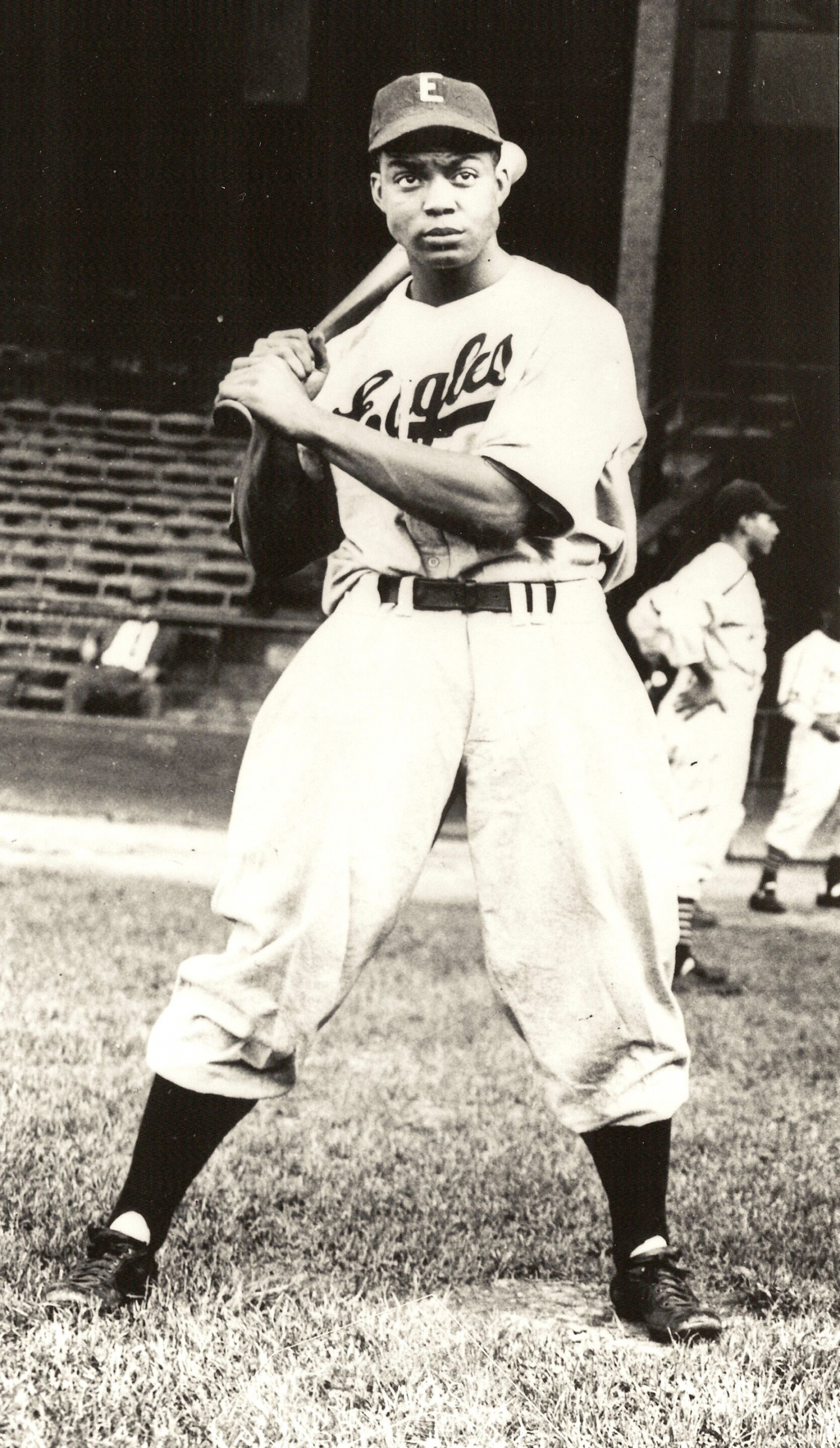 Game Two of the World Series was played at Ruppert Stadium in Newark, New Jersey, on the night of Thursday, September 19, before a crowd of 9,787. In a pregame ceremony, heavyweight boxing champion Joe Louis threw out the first pitch. The pitching matchup featured Ford Smith for the Monarchs against Max Manning of the Eagles. Both pitchers started strong, with Smith allowing a run in the third inning but otherwise holding the Eagles in check over the first six innings. The Monarchs scored once in the fourth, and then extended their lead to 4-1 on Willard Brown’s three-run homer in the top of the fifth.
Game Two of the World Series was played at Ruppert Stadium in Newark, New Jersey, on the night of Thursday, September 19, before a crowd of 9,787. In a pregame ceremony, heavyweight boxing champion Joe Louis threw out the first pitch. The pitching matchup featured Ford Smith for the Monarchs against Max Manning of the Eagles. Both pitchers started strong, with Smith allowing a run in the third inning but otherwise holding the Eagles in check over the first six innings. The Monarchs scored once in the fourth, and then extended their lead to 4-1 on Willard Brown’s three-run homer in the top of the fifth.
In the bottom of the seventh, Larry Doby hit a two-run home run off Smith to bring the Eagles within a run. The Monarchs went to their bullpen and brought in Satchel Paige, hoping he would replicate his fine performance from the previous game. However, after Monte Irvin singled, Lennie Pearson drove a ball well over the left-field fence, only to have the blast called foul by umpire Bullet Rogan. After an extended argument over the foul-ball call, Pearson drove the ball to left, where it was bobbled by Johnny Scott, allowing Irvin to score and tie the game. Paige then gave up successive hits to Davis, Ruffin, and Manning, and when the inning finally ended, the Eagles had scored six runs and won the game, 7-4. Max Manning pitched a complete game, striking out eight for the win, with Paige taking the loss.3
|
Monarchs |
|
0 |
0 |
0 |
0 |
1 |
3 |
0 |
0 |
0 |
|
4 |
2 |
2 |
|
Eagles |
|
0 |
0 |
1 |
0 |
0 |
0 |
6 |
0 |
X |
|
7 |
12 |
2 |
Game Three: September 22, 1946
Kansas City Monarchs 15, Newark Eagles 5
Blues Stadium, Kansas City, MO
The third game of the World Series was scheduled for Sunday, September 22, but was rained out, taking away a big Sunday crowd and payday for the teams. The series resumed instead on Monday, September 23, at Blues Stadium in Kansas City. Jim LaMarque toed the slab for the Monarchs while Len Hooker started for the Eagles.
The game quickly became a blowout for the hometown Monarchs, who scored runs in six of the eight innings in which they batted. They tagged Len Hooker for nine hits and six runs before chasing him after the fourth inning. Suffering worse was Eagles reliever Cotton Williams, who gave up 11 hits and 9 runs in 3⅔ innings of work.
Chico Renfroe, Herb Souell, and Hank Thompson each had four hits, and Ted Strong hit a 360-foot home run to right field in the Monarchs’ seven-run barrage in the eighth inning. LaMarque benefited from the run support, as he gave up five runs to the Eagles but struck out eight in going the distance for the win.4
|
Eagles |
0 |
2 |
0 |
0 |
0 |
1 |
2 |
0 |
0 |
5 |
7 |
3 |
||
|
Monarchs |
1 |
4 |
0 |
1 |
1 |
1 |
0 |
7 |
X |
15 |
21 |
1 |
Game Four: September 24, 1946
Newark Eagles 8, Kansas City Monarchs 1
Blues Stadium, Kansas City, MO
Game Four of the Series was played on Tuesday, September 24. It was again a night game played at Blues Stadium. A sparse crowd of 3,836 was in attendance. Rufus Lewis started the game for the Eagles against Ted Alexander for the home-team Monarchs. The Monarchs struck first, scoring a run in the second inning. The run came when Willard Brown singled, stole second, advanced to third on an infield out, and scored on Buck O’Neil fly ball to center field.
After that run, the remainder of the offense belonged to the Eagles. Newark scored two runs in the third and again in the fifth, chasing Alexander from the game. Satchel Paige came on in relief once more and again was ineffective, giving up three runs to the Eagles in the sixth and a soaring home run over the right-field fence to Monte Irvin in the seventh. Larry Doby also slugged the ball, collecting a double and triple along with a stolen base. But the offensive star of the game for the Eagles was leadoff hitter Jimmy Wilkes, who went 4-for-5 with two doubles and four runs scored. The overall star of the game, however, had to be Eagles hurler Rufus Lewis. Lewis dominated the Monarchs in pitching a complete game, scattering four hits and walking none while striking out six.
With their victory, the Eagles tied the series at two games apiece as the teams now moved on to Chicago for Game Five.5
|
Eagles |
0 |
0 |
2 |
0 |
2 |
3 |
1 |
0 |
0 |
8 |
14 |
0 |
||
|
Monarchs |
0 |
1 |
0 |
0 |
0 |
0 |
0 |
0 |
0 |
1 |
4 |
3 |
Game Five: September 25, 1946
Kansas City Monarchs 5, Newark Eagles 1
Comiskey Park, Chicago, IL
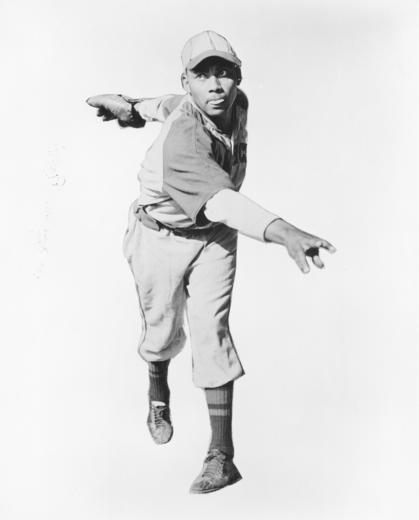 The fifth game of the series was played on the evening of Wednesday, September 25, before 4,000 fans at Comiskey Park in Chicago. The Monarchs played as the home team and sent Hilton Smith to the mound to start the game against the Eagles’ Max Manning. Both pitchers started strong, blanking their opponents over the first three innings.
The fifth game of the series was played on the evening of Wednesday, September 25, before 4,000 fans at Comiskey Park in Chicago. The Monarchs played as the home team and sent Hilton Smith to the mound to start the game against the Eagles’ Max Manning. Both pitchers started strong, blanking their opponents over the first three innings.
In the fourth, Hank Thompson walked, stole second, and then advanced to third on a hot shot to short that was knocked down by Monte Irvin. Ford Smith then singled to drive Thompson home. Smith was playing right field in place of Ted Strong, who had left the team after the fourth game of the Series to play in the Puerto Rican Winter League.
In the sixth inning, Thompson again got things started for the Monarchs, this time with a double. He advanced to third on a groundout by Willard Brown and then scored on a squeeze bunt executed by Buck O’Neil. Then John Scott tripled and scored on a wild pitch by Manning to give the Monarchs a 3-1 lead. In the seventh the Monarchs scored two more. Hilton Smith and Chico Renfroe both singled and were then driven home on a two-run double by Willard Brown.
Although they had 10 hits in the game, the Eagles were limited to one run. They scored in the eighth inning when Monte Irvin singled and scored on a double by Lennie Pearson. Despite giving up 10 hits, Hilton Smith walked only one and struck out eight to earn the complete-game win. Max Manning struck out seven and took the loss. The Monarchs now led three games to two and needed but one more win to take the Series.6
|
Eagles |
0 |
0 |
0 |
0 |
0 |
0 |
0 |
1 |
0 |
1 |
10 |
1 |
||
|
Monarchs |
0 |
0 |
0 |
1 |
0 |
2 |
2 |
0 |
X |
5 |
9 |
0 |
Game Six: September 27, 1946
Newark Eagles 9, Kansas City Monarchs 7
Ruppert Stadium, Newark, NJ
For Game Six of the World Series, the teams traveled back to Newark, where they played on Friday night, September 27, at Ruppert Stadium. Leon Day, who had been given extra rest after his Game One start, pitched for the Eagles against Jim LaMarque, who had started Game Three for the Monarchs. However, neither pitcher went beyond the first inning.
The Monarchs started hot, scoring five runs in the first inning, including a three-run clout over the center-field fence by Willard Brown. After the Monarchs’ first-inning offensive explosion, Leon Day was relieved by Len Hooker. Day, however, did not leave the game. He moved to center field, which he manned for the rest of the game. In the Eagles’ half of the first, LaMarque walked the first three batters. Len Pearson and Leon Ruffin followed with singles to score a total of four runs, and bring the score to 5-4 after the raucous first inning.
Steve Wylie relieved LaMarque, and gave up two more runs to the Eagles on Monte Irvin’s home run in the bottom of the second. The Eagles scored two more runs in the fourth on Pearson’s home run, to make the score 8-5. Wylie was relieved by Ted Alexander in the fifth. The Eagles tacked on one more run in the sixth on Monte Irvin’s second home run of the game, making the score 9-5.
The Monarchs tried to come back once more in the seventh, on a single by Willard Brown and a home run by Buck O’Neil, his first round-tripper of the season. However, Len Hooker was able to otherwise shut down the Monarchs and get the win for the Eagles, thanks to the support he received from his fellow moundsman Day, who was now manning center field. Monte Irvin recalled that “Buck O’Neil hit a deep line drive to right center field and Leon made a great over-the-shoulder catch to save the game.”
As for Irvin, he scored four runs in the game as the Eagles staved off elimination and forced a seventh and final game for the Series.7
|
Monarchs |
5 |
0 |
0 |
0 |
0 |
0 |
2 |
0 |
0 |
7 |
11 |
2 |
||
|
Eagles |
4 |
2 |
0 |
2 |
0 |
1 |
0 |
0 |
X |
9 |
10 |
3 |
Game Seven: September 29, 1946
Newark Eagles 3, Kansas City Monarchs 2
Ruppert Stadium, Newark, NJ
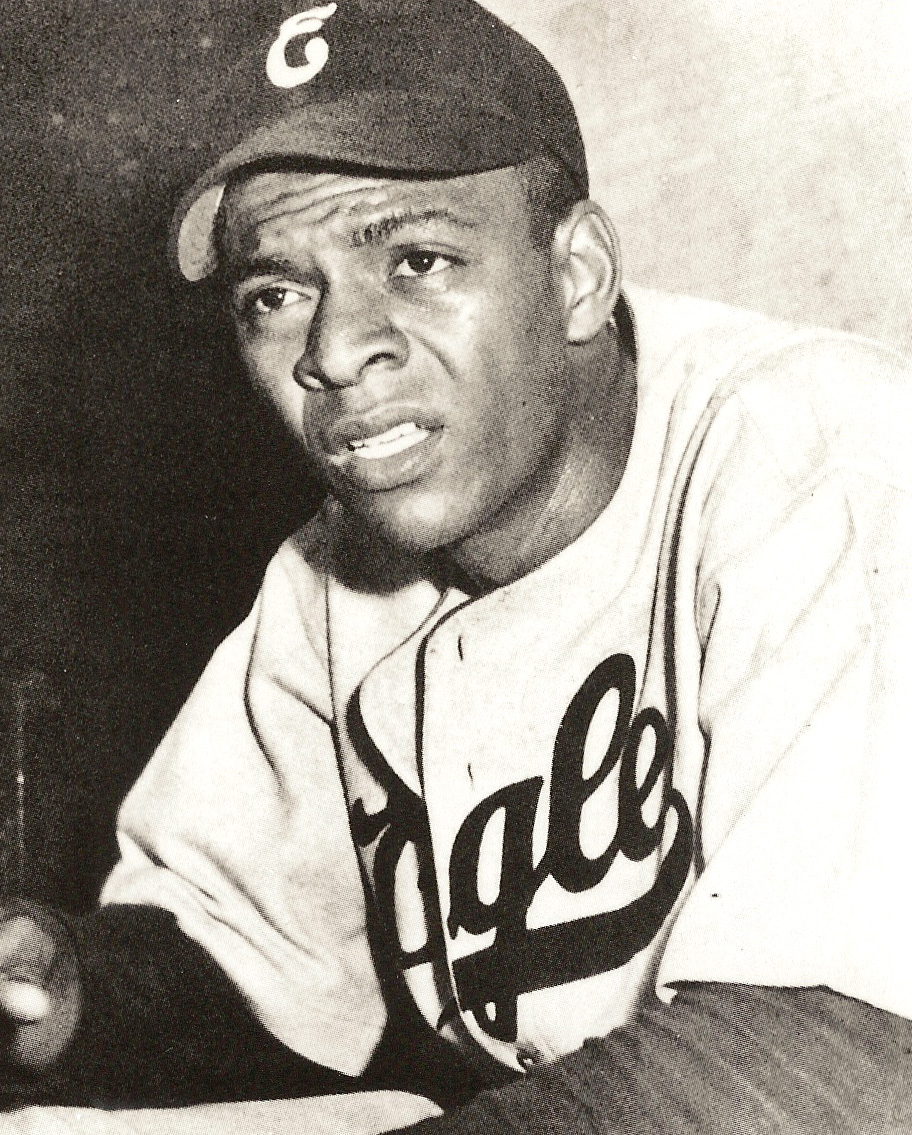 The seventh and deciding game of the 1946 Negro League World Series was played on Sunday afternoon, September 29, at Ruppert Stadium. A total of 7,200 fans were in attendance for the game to see who would be crowned the champions of the Negro Leagues for 1946. Among those in attendance were scouts from the New York Giants and Brooklyn Dodgers. The pitching matchup featured Ford Smith, starting his second game of the Series for Kansas City, against Newark’s Rufus Lewis, also starting his second game after his dominant performance in Game Four.
The seventh and deciding game of the 1946 Negro League World Series was played on Sunday afternoon, September 29, at Ruppert Stadium. A total of 7,200 fans were in attendance for the game to see who would be crowned the champions of the Negro Leagues for 1946. Among those in attendance were scouts from the New York Giants and Brooklyn Dodgers. The pitching matchup featured Ford Smith, starting his second game of the Series for Kansas City, against Newark’s Rufus Lewis, also starting his second game after his dominant performance in Game Four.
An intriguing twist to this game was the absence of both Willard Brown and Satchel Paige, who failed to appear at the ballpark for the game. Brown apparently missed the game because he was in New York City signing a contract to play winter ball in Puerto Rico. Paige likely was making plans for the barnstorming tour that he was soon going to lead, going up against a team led by Bob Feller. Buck O’Neil, in his autobiography I Was Right on Time, said, that Paige had been slated to start the game. However, he also opined that Ford Smith was pitching better in the series than Paige and believed that Paige’s absence might not have made any difference.8
The Eagles got things started right away, scoring a run in the first inning. Pat Patterson reached on an error by Monarchs second sacker Hank Thompson, moved to second on a walk to Larry Doby, and scored on a single by Monte Irvin. After this tally, both starters held the other team in check until the sixth inning.
In the top of the sixth, Buck O’Neil hit a solo home run, his second round-tripper of the Series, to tie the game. In the bottom of the sixth, Ford Smith lost his control for a time, walking Larry Doby and Monte Irvin on eight straight pitches. Johnny Davis then drove both men home on a double, giving the Eagles a 3-1 lead. The Eagles collected only three hits in the game, but they made the most of their opportunities.
In the top of the seventh, Jim Green, Ford Smith, and Herb Souell each singled, but the Monarchs were able to score only one run, leaving the Eagles ahead, 3-2. The Monarchs tried to rally in the ninth. Leading off the inning, Monarchs catcher Earl Taborn singled to right but was thrown out trying to stretch the hit into a double. The Monarchs put two more men on base, but Rufus Lewis was able to battle through and prevent the Monarchs from scoring, giving the Eagles the 3-2 victory in the game and a four-games-to-three victory in the Series.9
|
Monarchs |
0 |
0 |
0 |
0 |
0 |
1 |
1 |
0 |
0 |
2 |
8 |
2 |
||
|
Eagles |
1 |
0 |
0 |
0 |
0 |
2 |
0 |
0 |
X |
3 |
3 |
1 |
Postscript
Monte Irvin led the Eagles in the series, batting .462 with 3 home runs and 8 RBIs. Rufus Lewis pitched two complete-game victories and had an ERA of 1.23 in 22 innings. On the Monarchs’ side, Willard Brown hit three home runs and Buck O’Neil hit two.
It was reported by Monte Irvin that each Eagles player received $600 for winning the Series and that Eagles co-owner Effa Manley was the happiest woman in Newark.10 Many of the Eagles, along with a number of the Monarchs, joined the Satchel Paige All-Stars immediately after the Series.
The players on the All-Stars included Eagles Monte Irvin, Rufus Lewis, Max Manning, and Lennie Pearson; the Monarchs were Frank Duncan, Willard Brown, Hank Thompson, Hilton Smith, and Buck O’Neil (in addition to Paige himself). Their barnstorming tour started in Pittsburgh on September 30, just one day after the end of the World Series.
Sources
Box scores for the 1946 Negro League World Series can be found at Retrosheet.org: https://www.retrosheet.org/NegroLeagues/1946PS.html
Clark, Dick, and Larry Lester, eds. The Negro Leagues Book (Cleveland: Society for American Baseball Research, 1994).
Moore, Joseph Thomas. Pride Against Prejudice: The Biography of Larry Doby (New York: Praeger, 1988).
Overmyer, James. Queen of the Negro Leagues: Effa Manley and the Newark Eagles (Lanham, Maryland: Scarecrow Press, 1998).
Riley, James A. The Biographical Encyclopedia of the Negro Baseball Leagues (New York: Carroll & Graf Publishers, Inc., 1994).
seamheads.com.
Notes
1 This list includes, from the Monarchs: Willard Brown, Satchel Paige, Hilton Smith, and J.L. Wilkinson; and from the Eagles: Leon Day, Larry Doby, Monte Irvin, Biz Mackey, and Effa Manley. Wilber “Bullet” Rogan, former Monarchs pitcher, served as an umpire for several of the games in the Series as well.
2 For Game One, the following references were used: “Eagles Bow,” Newark News, September 18, 1946; Sam Lacy, “19,423 Fans See Paige in Brilliant Performance,” Afro-American, September 21, 1946: 13.
3 For Game Two, the following references were used: “Eagles Win, Even Series,” Newark News, September 20, 1946; Sam Lacy, “Birds Rap Paige to Even Series,” Afro-American, September 21, 1946: 13.
4 For Game Three, the following references were used: “Eagles Beaten at Kansas City,” Newark News, September 24, 1946; “Monarchs Take Lead in Series,” Afro-American, September 24, 1946: 17.
5 For Game Four, the following references were used: “Series Is Tied as Eagles Win,” Newark News, September 25, 1946; “Monarchs Take 3-2 World Series Lead,” Afro-American, September 26, 1946: 31. (Note that this article combines the stories for Games Four and Five for the series).
6 For Game Five, the following references were used: “Eagles Returning Here, Trailing 3-2,” Newark News, September 26, 1946; “Monarchs Take 3-2 World Series Lead,“ Afro-American, September 26, 1946: 31; “Monarchs Take Lead,” The Call (Kansas City), September 26, 1946; Frank Young, “Monarchs Win 5th Game of World Series Played in Chicago, 5-1,” The Call, September 27, 1946.
7 For Game Six, the following references were used: “Eagle Homers Knot Series,” Newark News, September 28, 1946; “Eagles Beat Monarchs, Square Negro Series,” News Journal (Wilmington, Delaware), September 28, 1946: 10; Monte Irvin with James A. Riley, Nice Guys Finish First: The Autobiography of Monte Irvin (New York: Carroll & Graf, 1996), 106.
8 Buck O’Neil with Steve Wulf and David Conrads, I Was Right on Time (New York: Simon & Schuster, 1996), 176-179.
9 For Game Seven, the following references were used: “Eagles Hit in Clutches,” Newark News, September 30, 1946; “Newark Eagles Win World Series Crown: Whip Monarchs, 3-2, Before 7,200,” Afro-American, October 5, 1946: 17.
10 Irvin with James A. Riley, 107.
Additional Stats
Newark Eagles vs.
Kansas City Monarchs
Polo Grounds
New York, NY
Ruppert Stadium
Newark, NJ
Blues Stadium
Kansas City, MO
Comiskey Park
Chicago, IL
Box Scores + PBP:
Corrections? Additions?
If you can help us improve this game story, contact us.


